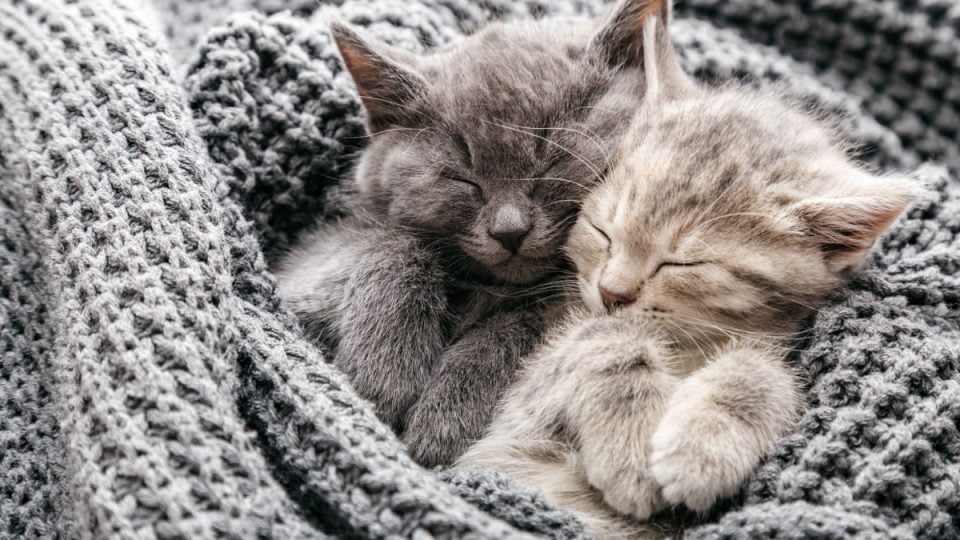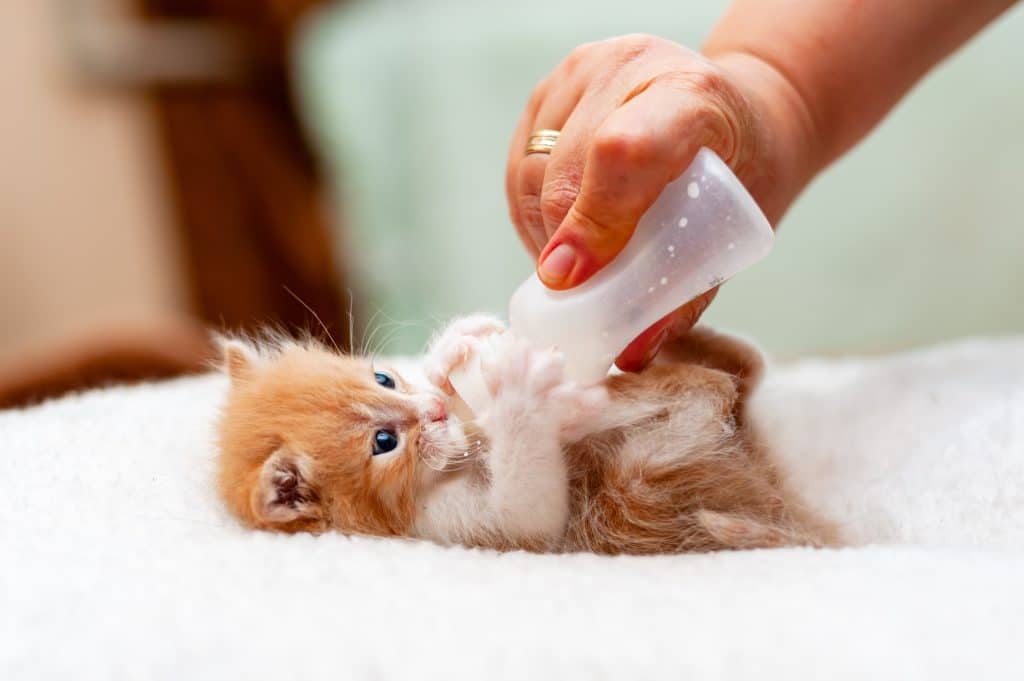- Not a substitute for professional veterinary help.
Caring for a newborn kitten is an exciting and challenging undertaking. The first 12 weeks are transformative, as kittens quickly grow from delicate newborns to lively companions. To provide the best care at each stage, you’ll want to track your kitten’s development through key indicators like weight, eyes, ears, teeth, and behavior.
For tips on early kitten care, we tapped the expertise of three veterinarians: Dr. Lara Girsko, chief editor at ThePetStaff, Dr. Preston Turano from Felix Cat Insurance, and Dr. Wayne M. Johnson of Birdneck Animal Hospital.
Here’s what you can expect regarding developmental milestones and kitten care for the first 12 weeks. As always, we strongly recommend working closely with a trusted veterinarian to ensure your tiny treasure receives the best care possible.
Kittens 0-1 Week Old
Development
Weight range: 50-250 grams
Physical appearance: Kittens enter the world blind and deaf, with eyes tightly shut and ears folded flat against their heads. At birth, their mouths are pink and toothless. They still have their umbilical cords, which will fall off naturally after four to five days—no need to intervene! These little wonders are so small they can fit comfortably in your palm.
Expected behavior: During their first week, kittens spend most of their time sleeping and feeding. Within the first few days, you might hear gentle purring. Healthy kittens will squirm and softly meow when handled, even though they can’t move around much yet.
Care Guidelines
Temperature needs: Keep ambient temperature between 85 to 90°F. Young kittens can’t regulate their body heat, so providing a heat source like a heating pad or lamp is vital.
Supervision requirements: Never leave kittens alone for the first four weeks without their mother or caregiver. “They require constant warmth, feeding, and attention,” explains Dr. Lara Girsko. Keep kittens safe in a confined nesting area. And try to minimize handling—especially with kittens who missed the crucial immune-boosting colostrum from their mothers.
Feeding: Newborn kittens should be nursed or bottle-fed with a specialized kitten formula every two to four hours. Avoid cow’s milk, as it can upset their delicate tummies. Feed slowly to prevent choking, as newborn kittens lack a gag reflex at this age. Use 2 tablespoons (30 ccs) of formula for every 4 ounces of body weight daily, with a target weight gain of approximately ½ ounce per day.
Grooming: Newborn kittens don’t need baths unless they get very dirty. If the mother cat can’t clean them, gently wipe the kittens down with a warm, slightly damp washcloth after feeding, and ensure they are towel-dried promptly to prevent chills.
Socialization: Focus on keeping these little ones close to their mother or littermates for now. “They need their rest, as does Mom,” says Dr. Turano. Handle newborn kittens gently, wash your hands, and be cautious around other animals.
Additional notes: If the mother cat is absent, you’ll need to stimulate bowel movements for the first three weeks. After feeding, gently rub their belly, genitals, and anal area with a soft cloth until they go poop, typically once a day. A visit to the veterinarian is also recommended soon after birth to ensure both mother and kittens are healthy and to check for any congenital abnormalities.
-
iStock/MriyaWildlife
Kittens 1-2 Week Old
Development
Weight range: 250-350 grams. Birth weight should be roughly doubled by week one.
Physical appearance: Between one and two weeks, a kitten’s eyes will open, offering a glimpse of the world (though their vision will remain blurry). All kittens are born with entirely blue eyes. Ears will unfold around day seven. By now, kittens should also be able to hold their heads up.
Expected behavior: At this age, kittens are all about sleep and nursing. Their initial movement is limited to gentle wiggling, but you’ll see their first wobbly steps in the upcoming weeks!
Care Guidelines
Temperature needs: Keep ambient temperature between 80 to 85°F. Provide a heat source, such as a heating pad or lamp.
Supervision requirements: Kittens this age still need round-the-clock care. Ensure they are never left alone without their mother or a responsible caregiver.
Feeding: Continue nursing or bottle-feeding with a kitten-specific formula every two to four hours.
Grooming: Keep kittens clean and dry using a soft towel, and use kitten-safe wipes for any messes.
Socialization: Kittens should remain close to their mother and primary caregivers to prevent disease. Keep practicing good hygiene by washing your hands before touching them.
Additional notes: Remember to keep stimulating their bowel movements if needed.
Kittens 3-4 Weeks Old
Development
Weight range: 350-550 grams
Physical appearance: Baby teeth (“milk teeth”) emerge around three weeks, revealing an adorable toothy grin. A kitten’s ears perk up, and their adult eye color starts to appear, though it won’t reach its final shade for several weeks.
Expected behavior: You’ll begin to see more mobility around this time. Kittens start to walk around three weeks, though their movement will be wobbly and limited to short bursts. By week four, however, their balance will improve, and they’ll be more confident to jump, play, and pounce with littermates. They’ll also begin interacting with people and toys. This is an ideal time to begin litter training.
Care Guidelines
Temperature needs: Keep ambient temperature between 70 to 75°F. Provide a heat source, such as a heating pad or lamp.
Supervision requirements: Constant supervision should continue until kittens reach four weeks of age.
Feeding: You can start the weaning process at four weeks. Introduce wet kitten food by mixing it with kitten formula to create a tasty “slurry.” Plan for four to five small meals a day, gradually reducing the amount of formula until the kittens are just eating food. Continue nursing or bottle-feeding during this transition.
Grooming: If mealtime gets messy, gently clean kittens with a cat-safe wipe and ensure they are dry to prevent chills.
Socialization: Around three weeks, it’s time to expose kittens to various sights, sounds, and gentle handling. “Positive experiences with different environments and people will help them grow into friendly, well-adjusted cats,” says Dr. Girsko. Just avoid exposure to unvaccinated cats until your kitten receives their shots.
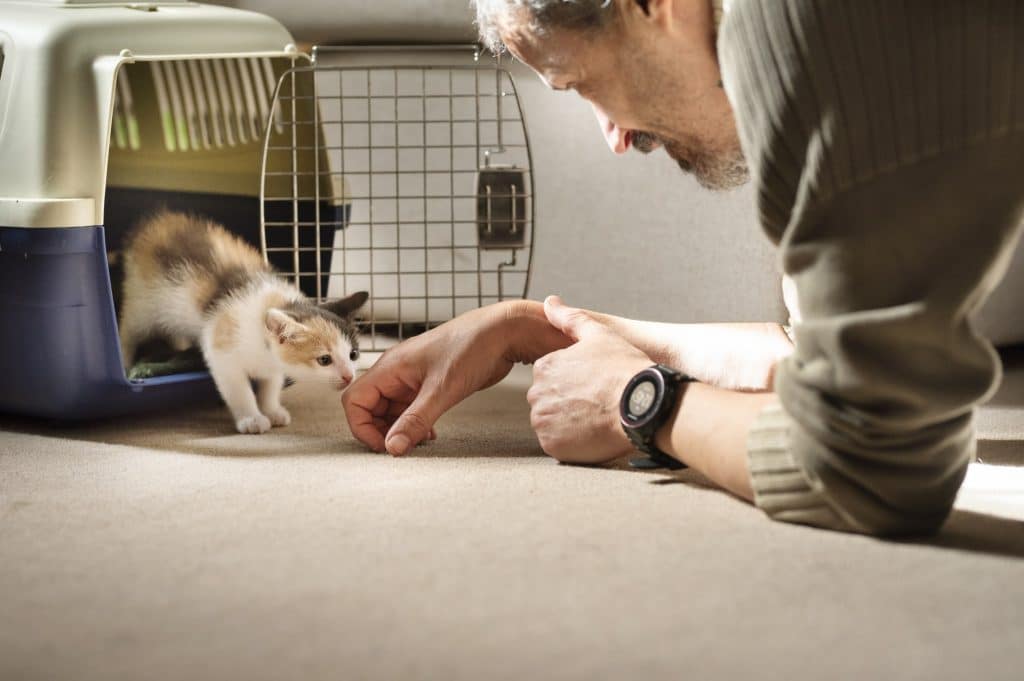
iStock/NickyLloyd
Kittens 5-6 Weeks Old
Development
Weight range: 550-750 grams
Physical appearance: According to Dr. Turano, a six-week-old kitten will have fully developed vision and hearing, although they’ll still sport their baby blue eyes. Male kittens will show visible testicles. This is also when pre-molars emerge—look for a ridge behind your kittens’ canines.
Expected behavior: These playful explorers are gaining coordination and confidence. “Climbing and pouncing are the new hobbies,” adds Dr. Girsko. Kittens this age are learning to groom themselves and should be using the litter box. While they’re certainly more active, don’t be surprised if they still snooze for half the day!
Care Guidelines
Temperature needs: Keep ambient temperature between 70 to 75°F. You can phase out an external heat source at around six weeks, but kittens should still have access to a warm, cozy spot.
Supervision requirements: At around five weeks, kittens can be left alone for short periods, but Dr. Girsko advises checking in often. Kittens this age should always be supervised during their explorations.
Feeding: You can begin offering kitten kibble alongside wet food around five weeks.
Grooming: This is the perfect time to introduce a soft brush and get kittens used to regular coat care. Don’t forget to begin nail trimming and teeth brushing early to ease them into these routines.
Socialization: Socialization is vital at this age! Build your six-week-old kitten’s confidence by engaging in interactive play and exposing them to various household sounds, like the TV or vacuum.
Kittens 7-8 Weeks Old
Development
Weight range: 750-1,000 grams
Physical appearance: By seven to eight weeks, kittens resemble miniature versions of their adult selves. All of their baby teeth are usually present by eight weeks, and their adult eye color is fully developed.
Expected behavior: Prepare for some lively antics! By eight weeks, Dr. Turano says these tiny balls of energy will be running, playing, and climbing anything they can find. Most kittens understand how to use a litter box by this point.
Care Guidelines
Temperature needs: Keep ambient temperatures between 70 to 75°F. Kittens should have access to a warm, cozy spot.
Supervision requirements: While kittens still benefit from supervision, you can ease up as they approach eight weeks. At this point, they can eat independently and use the litter box, so less attention is needed.
Feeding: Offer a well-balanced diet of high-quality wet or dry food in three to four meals daily. Remember, these kittens have tiny stomachs, so frequent, smaller meals are best to keep their energy up!
Grooming: By eight weeks, kittens will become skilled at grooming themselves. You can safely bathe a kitten now, but take care to keep them warm.
Socialization: Kittens are ready for their first vaccinations at eight weeks, so you can safely introduce them to other cats. Continue exposing kittens to new sights, sounds, and scents.
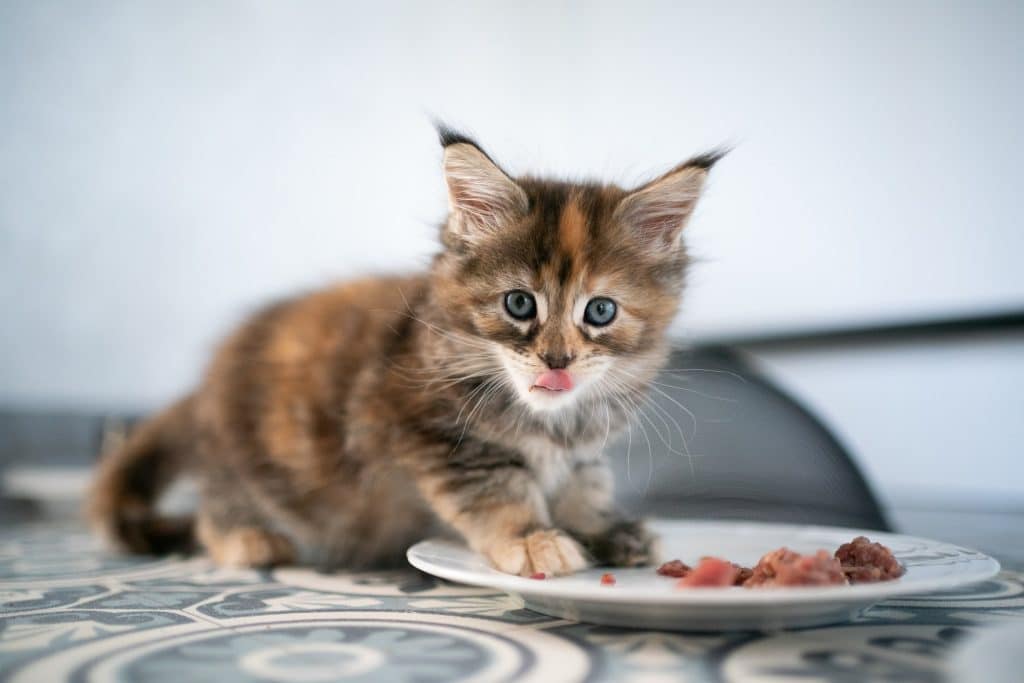
iStock/Nils Jacobi
Kittens 9-12 Weeks Old
Development
Weight range: 1,000-1,300 grams
Physical appearance: You may notice baby teeth beginning to fall out. Kittens will continue to grow until they reach their full size at around 12 months.
Expected behavior: By this stage, kittens display behavior and body language similar to adult cats. You might catch them stalking toys or becoming interested in catnip. If properly socialized, you can expect affection and cuddles. Kittens this age love to claw, so be sure to provide a good scratching post.
Care
Temperature needs: Keep ambient temperature between 70 to 75°F. Ensure your kittens have access to a warm, cozy spot.
Supervision requirements: By 9 to 12 weeks, Dr. Johnson says kittens can be left alone for a couple of hours. Make sure they’re in a safe, kitten-proofed area.
Feeding: By week 9 or 10, kittens will be completely weaned and transition to solid food exclusively.
Grooming: Grooming routines should continue, with regular weekly brushing and inspections of the eyes, ears, and paws to maintain cleanliness.
Socialization: Continue to handle your kitten gently and expose them to different environments. This builds their comfort with human interaction and prepares them for adoption.
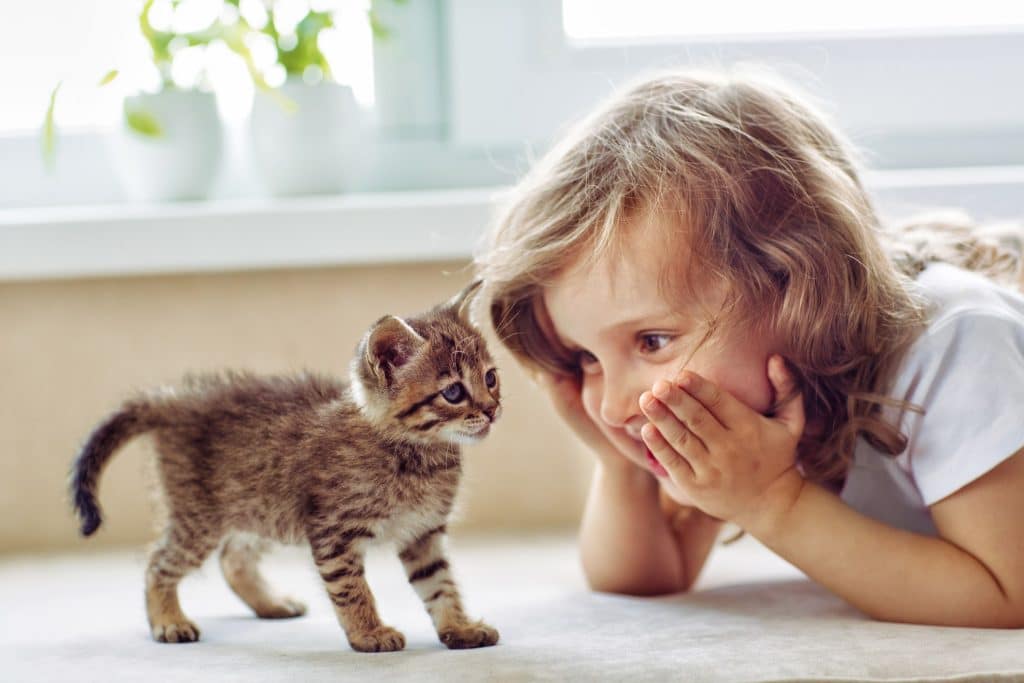
iStock/Siarhei SHUNTSIKAU
How To Find a Kitten a Home
Whether you plan to keep a kitten or find them a new home, we have essential steps to ensure their well-being and a smooth transition for everyone involved.
What to do if you DON’T intend to keep your found kitten
If you’ve found a kitten but can’t commit to keeping them, the first step is seeing to their immediate well-being. Make sure the kitten is safe, warm, and well-fed. It’s also essential to schedule a veterinary check-up to ensure the kitten is healthy and up-to-date on vaccinations.
Next, connect with local animal shelters and rescue groups—many are eager to assist in rehoming strays. Additionally, use social media and community platforms to share the kitten’s details—sometimes, a loving home is just a post away!
Consider fostering the kitten temporarily while seeking permanent adopters. This provides a safe space for the kitten and allows you to interact with potential adopters. Encourage friends and family to spread the word, and don’t hesitate to create flyers to post in your neighborhood.
What to do if you DO intend to keep your found kitten
Congratulations on deciding to keep your found kitten! Start by scheduling a visit to the veterinarian for a health check and any vaccinations they may need.
Next, prepare your home for a kitten by creating a cozy space with a comfortable bed, litter box, and some engaging kitten toys.
Try to spend quality time bonding with your kitten through gentle play and petting sessions. The more positive experiences you share, the stronger your bond will become. With a bit of patience and a lot of love, your new kitten will soon feel right at home.
